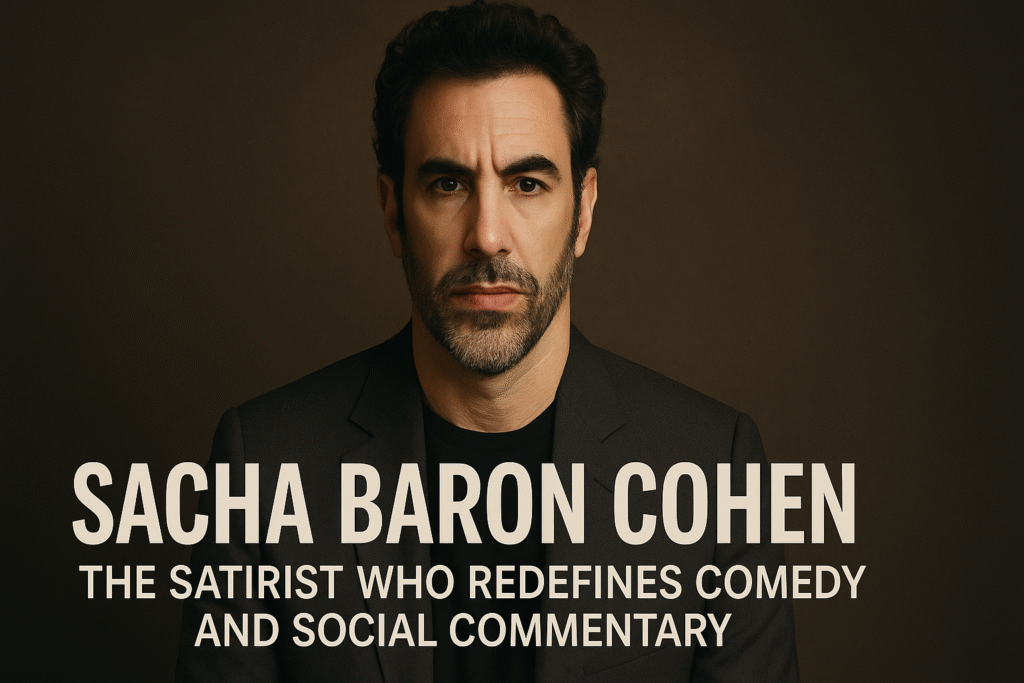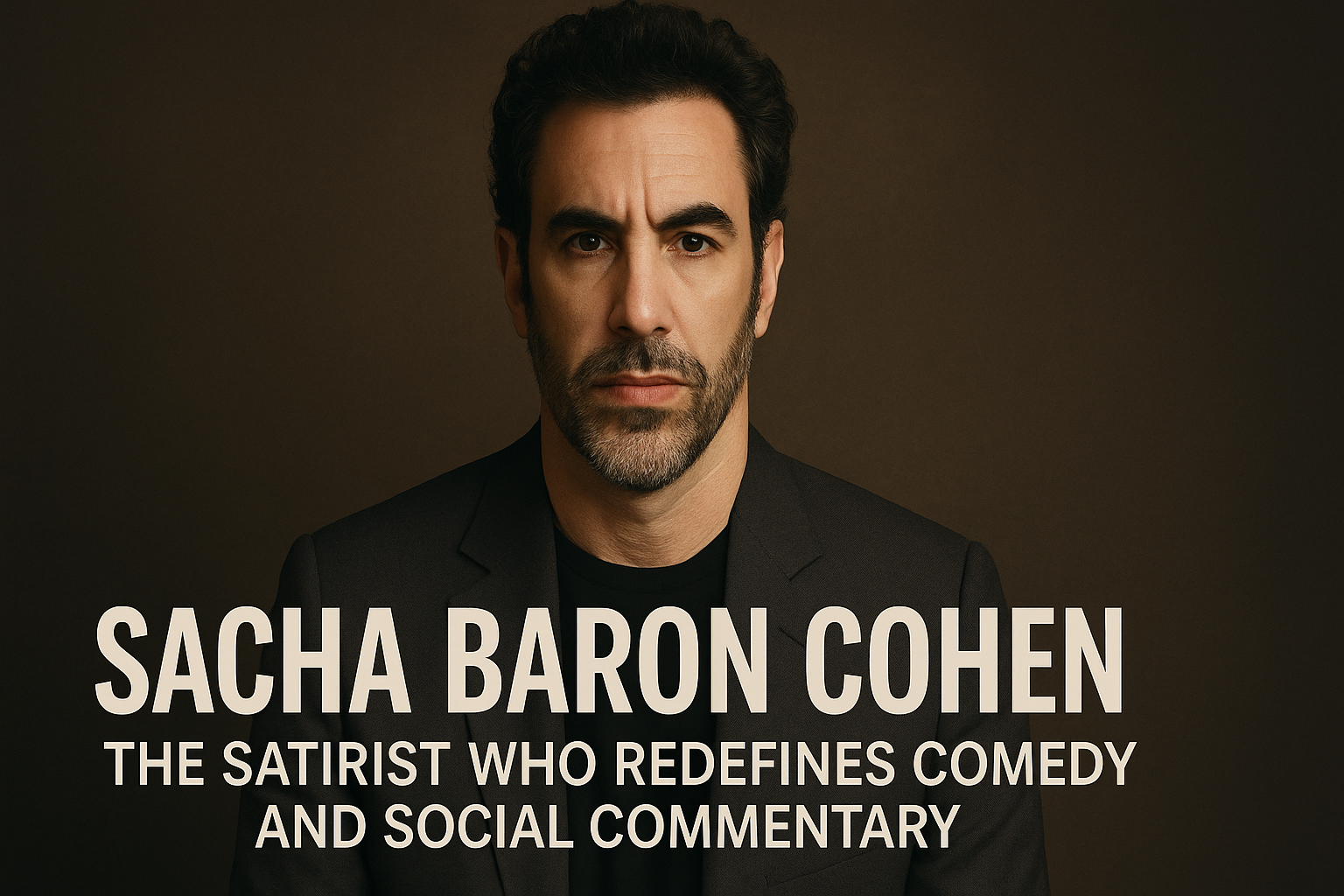Sacha Noam Baron Cohen, born on October 13, 1971, in Hammersmith, London, is a British actor, comedian, and performance artist whose work has left an indelible mark on modern comedy and social discourse.
Renowned for his provocative, boundary-pushing satirical characters like Ali G, Borat Sagdiyev, Brüno Gehard, and Admiral General Haffaz Aladeen, Baron Cohen has mastered the art of blending humor with sharp social commentary.
His unique approach—using immersive, improvisational personas to expose prejudice, ignorance, and hypocrisy—has earned him global acclaim, multiple awards, and a reputation as one of the most fearless entertainers of his generation.
Early Life and Path to Comedy
Baron Cohen was born into a devout British Ashkenazi Jewish family, with his mother from Israel and his father of Eastern European Jewish descent.
His upbringing in a culturally rich environment shaped his worldview and passion for challenging intolerance.
Educated at the prestigious Haberdashers’ Aske’s Boys’ School, he later studied history at Christ’s College, Cambridge, focusing his thesis on the role of Jewish activists in the American civil rights movement. This academic foundation in social justice would later inform his comedic work.
As a student, he performed with the Cambridge University Amateur Dramatic Club and was influenced by comedic legends like Peter Sellers, whose ability to transform into multifaceted characters inspired Baron Cohen’s own approach.
His early career began with small television roles in the 1990s. After submitting a tape as an Albanian TV reporter (a precursor to Borat) to Channel 4, he landed hosting gigs on youth programs like Pump TV and F2F.
His big break came in 1998 with The 11 O’Clock Show, where he debuted Ali G, a dimwitted “hip-hop journalist” whose absurd interviews with unsuspecting politicians and celebrities revealed their biases.
The character’s popularity led to Da Ali G Show (2000–2004), introducing Borat, a Kazakh journalist, and Brüno, a flamboyant Austrian fashion reporter, both of whom became cultural phenomena.
The Art of Satirical Immersion
Baron Cohen’s genius lies in his method-like commitment to his characters. By staying in persona during interviews and public interactions, he creates a safe space for subjects to reveal their true beliefs, often exposing bigotry or ignorance.
His 2006 film Borat: Cultural Learnings of America for Make Benefit Glorious Nation of Kazakhstan was a global hit, grossing $262 million on an $18 million budget.
The mockumentary followed Borat’s journey across America, where encounters with real people—like a gun shop owner suggesting a weapon for “shooting Jews” or fraternity brothers longing for slavery—highlighted societal prejudices.
The film earned him a Golden Globe and an Oscar nomination for Best Adapted Screenplay.
Similarly, Brüno (2009) tackled homophobia and the absurdity of celebrity culture, with the titular character provoking reactions from unsuspecting subjects in the fashion and entertainment worlds.
The Dictator (2012) took a scripted approach, satirizing authoritarianism, while Who Is America? (2018) saw Baron Cohen adopt new personas to expose political and cultural divides in the U.S., famously tricking public figures like Rudy Giuliani into compromising situations.
His 2020 sequel, Borat Subsequent Moviefilm, addressed Trump-era politics and earned him another Golden Globe.

Beyond Comedy: A Voice for Change
While Baron Cohen’s work is rooted in comedy, his purpose transcends laughs. His 2019 speech at the Anti-Defamation League’s Never Is Now Summit marked a rare out-of-character moment, where he passionately criticized social media platforms like Facebook, calling them “the greatest propaganda machine in history” for amplifying hate speech and misinformation.
He argued that their algorithms prioritize engagement over truth, giving fringe voices undue reach. His provocative analogy—that Facebook would have allowed Hitler to post ads for his “solution” to the “Jewish problem”—sparked widespread debate.
Baron Cohen advocated for regulation, urging tech companies to hire moderators and work with organizations like the ADL to curb harmful content.
This activism reflects his lifelong commitment to social justice, evident in his early activism against apartheid and fascism as a teenager in the UK. His comedy, while often controversial, serves as a mirror to society, exposing uncomfortable truths.
Critics have occasionally accused his work of reinforcing stereotypes, but Baron Cohen counters that his characters are designed to dismantle prejudice by revealing its absurdity.
As director Adam McKay noted, Baron Cohen’s time in a kibbutz and his Jewish heritage inform a deep-seated commitment to justice, aligning him with a tradition of artists who use their platform for social good.
Dramatic Ventures and Legacy
Baron Cohen’s versatility extends beyond satire. He has taken on dramatic roles, showcasing his range as an actor. In The Trial of the Chicago 7 (2020), he portrayed activist Abbie Hoffman, earning an Oscar nomination for Best Supporting Actor.
His role as Israeli spy Eli Cohen in The Spy (2019) further demonstrated his ability to tackle serious material. These performances highlight a lesser-known facet of his talent, often overshadowed by his comedic personas.
Baron Cohen’s impact on comedy and culture is undeniable. His fearlessness—whether facing lawsuits, FBI scrutiny during Borat shoots, or death threats at a gun rally for Borat Subsequent Moviefilm—sets him apart.
His work has inspired comedians and filmmakers to push boundaries, blending humor with social critique. With accolades including two BAFTA TV Awards, three Golden Globes, and a SAG Award, his influence spans entertainment and activism.
Conclusion
At 53, Sacha Baron Cohen remains a singular force, using satire to challenge societal norms and advocate for change. His ability to navigate the line between provocation and enlightenment ensures his work resonates across generations.
Whether as Borat exposing bigotry or as himself calling out tech giants, Baron Cohen proves that comedy can be a powerful tool for truth. His legacy is one of courage, wit, and an unwavering commitment to confronting injustice, one laugh at a time.
